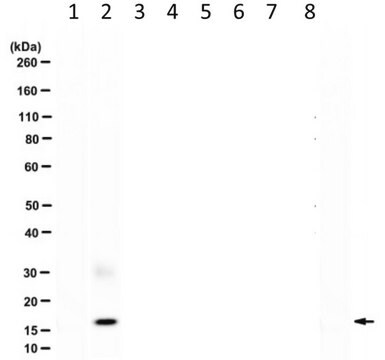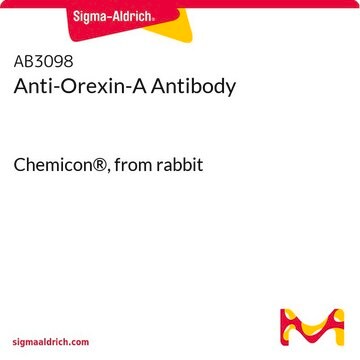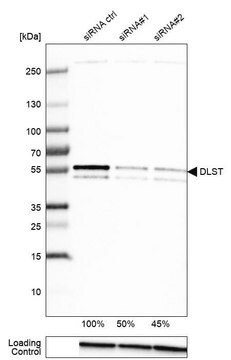MABC1709
Anti-Carcinoma Glycans Antibody, clone mAB-A4
clone mAb-A4, from mouse
Sinónimos:
Cancer Cell Glycans
Iniciar sesiónpara Ver la Fijación de precios por contrato y de la organización
About This Item
UNSPSC Code:
12352203
NACRES:
NA.41
Productos recomendados
biological source
mouse
clone
mAb-A4, monoclonal
species reactivity
human
technique(s)
flow cytometry: suitable
immunohistochemistry: suitable
immunoprecipitation (IP): suitable
western blot: suitable
isotype
IgMκ
storage temp.
2-8°C
target post-translational modification
unmodified
General description
Cancer cells contain distinctive glycan structures on their cell surface and their presence on glycoproteins or glycolipids can play a functional role in cancer progression. They are also important targets for cancer therapy. They can be targeted by monoclonal antibodies for detection and intervention. Clone mAb-A4 is shown to specifically bind only to glycans in breast, ovary, testis, lung, pancreas, bone and small intestine cancer cells, but not to benign cells in these tissues. Hence, it can be a useful tool to distinguish between malignant and benign cells. This antibody targets primarily N-linked glycans and bind to H-type I antigen (Fuc-alpha1,2-Gal-beta1,3-GlcNAc), with secondary binding to type I LacNAc. Removal of N-glycans, but not sialic acid, from the antigen using PNGaseF is shown to abolish the binding of this antibody. These antigens are also found to be pluripotency-associated antigens on human embryonic stem cells (hESC). This clone is shown to have a direct cytotoxic effect against hESC and SKOV3 ovarian cancer cells and cause significant reduction in their viability. (Ref.: Liau, B., et al. (2017). Sci. Rep. 7; 14489; Choo, M., et al. (2017). J. Biol. Chem. 292(15); 6163-6176).
Specificity
Clone mAb-A4 detects ovarian and breast cancer cells and targets H Type 1 glycans.
Immunogen
Live HES-3 human embryonic stem cells.
Application
Immunoprecipitation Analysis: A representative lot immunoprecipitated Carcinoma Glycans in Immunoprecipitation applications (Choo, M., et. al. (2017). J Biol Chem. 292(15):6163-6176).Immunohistochemistry Analysis: A representative lot detected Carcinoma Glycans in Immunohistochemistry applications (Choo, M., et. al. (2017). J Biol Chem. 292(15):6163-6176).Flow Cytometry Analysis: A representative lot detected Carcinoma Glycans in Flow Cytometry applications (Liau, B., et. al. (2017). Sci Rep. 7(1):14489; Choo, M., et. al. (2017). J Biol Chem. 292(15):6163-6176).Western Blotting Analysis: A representative lot detected Carcinoma Glycans in Western Blotting applications (Liau, B., et. al. (2017). Sci Rep. 7(1):14489; Choo, M., et. al. (2017). J Biol Chem. 292(15):6163-6176).
Quality
Evaluated by Flow Cytometry in BT-474 human breast carcinoma cells.Flow Cytometry Analysis: 1 µg of this antibody detected Carcinoma Glycans in one million BT-474 human breast carcinoma cells.
Physical form
Purified mouse monoclonal antibody IgM in buffer containing 0.1 M Tris-Glycine (pH 7.4), 150 mM NaCl with 0.05% sodium azide.
Format: Purified
Purification Method: Protein G purified
Format: Purified
Purification Method: Protein G purified
Storage and Stability
Stable for 1 year at 2-8°C from date of receipt.
Other Notes
Concentration: Please refer to lot specific datasheet.
Disclaimer
Unless otherwise stated in our catalog or other company documentation accompanying the product(s), our products are intended for research use only and are not to be used for any other purpose, which includes but is not limited to, unauthorized commercial uses, in vitro diagnostic uses, ex vivo or in vivo therapeutic uses or any type of consumption or application to humans or animals.
Certificados de análisis (COA)
Busque Certificados de análisis (COA) introduciendo el número de lote del producto. Los números de lote se encuentran en la etiqueta del producto después de las palabras «Lot» o «Batch»
¿Ya tiene este producto?
Encuentre la documentación para los productos que ha comprado recientemente en la Biblioteca de documentos.
Nuestro equipo de científicos tiene experiencia en todas las áreas de investigación: Ciencias de la vida, Ciencia de los materiales, Síntesis química, Cromatografía, Analítica y muchas otras.
Póngase en contacto con el Servicio técnico








